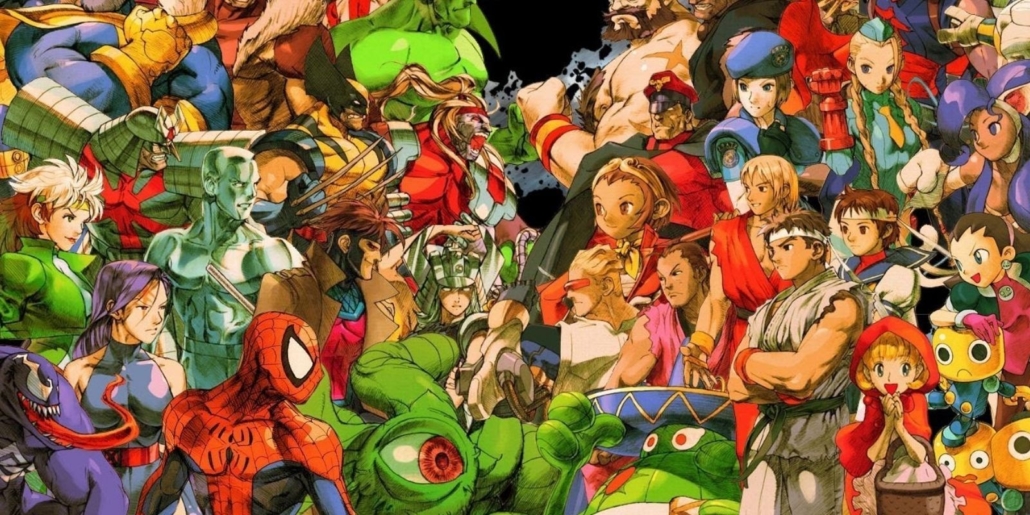Why Video Game Preservation Matters
When I was younger, my parents often took my sisters and me to Disney World. We lived three hours away and would stop at the same rest stop every trip. Each time, I was drawn to an arcade cabinet of Capcom’s 2000s masterpiece, Marvel vs. Capcom 2: New Age of Heroes. The game, sometimes dubbed “Marvel 2,” is a crossover fighting game developed by Capcom in collaboration with Marvel, pitting both universes against each other. Released in 2000, this game predates the Marvel Cinematic Universe (MCU) and its popularity but still contains notable characters such as Captain America, Iron Man, Spider-Man, and the X-Men. It’s a game that respects and celebrates Marvel’s legacy and serves as a time capsule of what was popular at the time and how the current landscape of Marvel films has changed so drastically. The game’s roster isn’t exclusively Marvel characters, however. Representing Capcom are staple characters from the Street Fighter series such as Ryu, Ken, and Chun-Li. There are also some obscure characters from Capcom’s back catalog, like Captain Commando, Tron Bonne, and even some characters from Capcom’s criminally underrated fighting game series Darkstalkers. It’s an incredibly fun and influential game that caters to different people and play styles.
Marvel vs. Capcom 2 is a celebration of two large companies who have produced characters and moments loved throughout the world. In 2021, the Marvel Cinematic Universe still reigned supreme in relevance and structure, creating a formula that forever changed the film industry. Capcom is hitting new peaks of significance due to the increasing quality of their games that began with their return to form in 2019 with the releases of Resident Evil 2: Remake and Devil May Cry V.
Despite the prevailing relevancies of both Marvel and Capcom in the entertainment industry, it might come as a surprise to learn that it’s almost impossible to legally purchase and own a functional copy of Marvel vs. Capcom 2. The game was last released on the Xbox 360 and then PlayStation 3 in 2009, and it was delisted from both platforms’ respective stores in 2013. For the past twelve months, it’s been in contractual hell and there are still many obstacles in the way to making a revival happen. This is a shame on a consumerist level but also a personal one.
Each time my family and I got to the rest stop, going to the arcade cabinet of Marvel vs. Capcom 2 was my top priority. Sometimes on the drives to Disney World, I would lie and say I needed to go to the rest stop so I had an excuse to watch the game’s demo over and over. I was too young to have money to play it, and my mom hated video games, so I could only watch the arcade machine. Everyone else just walked by, as if it had no significance. It was as if I existed alone in that space with the machine. My brain couldn’t process what I was seeing. All I knew was Spider-Man and Venom were fighting against the X-Men, using all their powers in the comics and shows I grew up reading and watching. My childhood was validated.
My father got me comics and DVDs of Marvel’s heroes, teaching me to love them, so seeing them fight one another was a mind-blowing treat. At the time, I didn’t know or understand what a fighting game was, but I could see that they were fighting each other, and it looked like so much fun. I wanted to experience it. Everything I loved at the time appeared before me with bright colors and fast gameplay and came with a roster that, even to this day, is championed as one of the best in fighting game history.
Marvel vs. Capcom 2 is so significant and beloved within the fighting game community and the overall gaming scene. The game has a twenty-two-year-old legacy, culminating in iconic moments that people within the fighting game community still cherish and reference. Its top players are still working within the scene, competing in tournaments for other games while making content for it on YouTube. The game is notorious for being chaotic, technical, and really fun, both as a spectator and a player. Along with Street Fighter III: 3rd Strike, Marvel vs. Capcom 2 helped establish different traditions that still exist in modern esports. It’s a game with a long history, a dedicated player base, and a lasting legacy that has led me to write about it now.
It’s easier now than ever to play and get into video games, but as we become more comfortable with digitization, I wonder about the preservation of old and lost video games, in the same way I wonder about old films and stories. While it’s still easy to access physical DVDs, Blu-Rays, physical CDs, and video game boxes, premium services such as Netflix, Spotify, and Xbox Game Pass have set a new standard through which we access and enjoy the content. We pay a monthly subscription to access a blanket of content we ultimately don’t get to own ourselves. It’s an easy and financially feasible way of experiencing art in all its forms, but, as mentioned, it reduces the need to hold the physical goods, which can either raise the price of the item or lower it, ultimately affecting availability. Is it more viable to own a physical copy when it would be cheaper and easier to access it from a digital database? While libraries and databases are still playing with this idea, other forms of media are making strides in providing consumers with digitized but somewhat public content, leading to a more corporate version of preservation that doesn’t hold any merit aside from convenience.
Many games from my childhood are no longer for sale, and the only way to play them is through emulation or the act of piracy. On February 16th, 2022, Nintendo announced it would be closing its Wii U and 3DS digital stores in March 2023. Up to one thousand games will disappear forever, and those virtual console services will be closed. Because Marvel vs. Capcom 2 is delisted, many resort to these tactics to play it. Computer emulation is when one machine copies or reproduces another system, usually done using software and/or hardware depending on what the machine is trying to emulate. Emulation, especially in video games, is very popular and one of the only ways to play video games no longer on the market, like Marvel vs. Capcom 2. It doesn’t have to be this way. It shouldn’t be this way. Especially since the video game industry generated more revenue in 2020 than both the movie and music industry combined.
Piracy is another way to play video games no longer on the market. What was once a legitimate culture of human history with its own Golden Age, piracy has now devolved into a term used to describe illegally downloading and consuming content of all types. Piracy affects every medium, from novels and essays to video games and film. In the twenty-first century, the prevalence of internet culture and our ability to access anything at any time we like makes piracy both avoidable and unavoidable and, because of this, controversial. On the one hand, it enables people of all classes to access content without spending money. On the other hand, stealing art prevents artists from profiting off their work and discourages them from creating new art pieces. It’s a complex situation with broader implications on both the video games industry and the entertainment industry. Art is timeless, but its recognition doesn’t last forever. As we move forward in the digital age, how do we preserve the physical things we love?
It’s sad that people have to resort to piracy and emulation when the publishers themselves can still sell most of these games. Because of these failings, however, there has been a subgenre of video games lost to time: film to video game adaptations. Throughout the 2000s, there was a surge in video games that were tie-ins to different films. These are included but are not limited to: The Lord of the Rings: The Two Towers, The Lord of the Rings: Return of the King, the legendary Spider-Man 2, Aladdin, and many, many others. However, the problem is these games have been delisted despite having dedicated fan bases that look back on those games with nostalgia and genuine adoration. These are all games I grew up on, and now I’m twenty-four and unable to play them legally, which makes me sad. I wish I could recreate so many games and experiences from my past but can’t because of licensing issues, the passing of time, or a paradigm shift within the gaming industry.
Video game preservation is something we don’t talk about enough, especially since the act of digital preservation grows more attractive as the years go by. It’s an issue with broad implications for every form of entertainment. I hate to think about all of the content lost to history, the most prominent example in my mind being The Library of Alexandria. Significant amounts of manuscripts, history, and cultures are gone. How much knowledge have we lost?
As we move forward, we miss items that deserve to be preserved forever, and I don’t want the same thing to happen to old video games. I don’t want it to happen to old novels that can fall apart. I don’t want it to happen to films that created genres and have inspired others.

Part of Marvel vs Capcom 2’s enduring legacy is its roster. Included are characters like Spider-Man, Jill Valentine, and Wolverine
When I first saw Marvel vs. Capcom 2, I was young, vulnerable, and curious, and I didn’t know how gaming would affect my life. Now, in 2022, as I emulate the game and desperately wait for a legal and official release, I think back on that same boy and my feelings. The arcade machine was removed from that rest stop a decade ago, and, after my mother died, we stopped going to Disney. I never got the closure I needed or wanted. My experience with the game, those trips, and my childhood are tied together, as memories often become. With better efforts at preserving video games, I hope to make new memories in the future, share what I once loved with new people (someday, with my children, perhaps), and relive those feelings. From the bottom of my heart, don’t let old games die.
Nicholas Galvez is a fiction writer. He likes writing about fantasy, romance, and video games.





